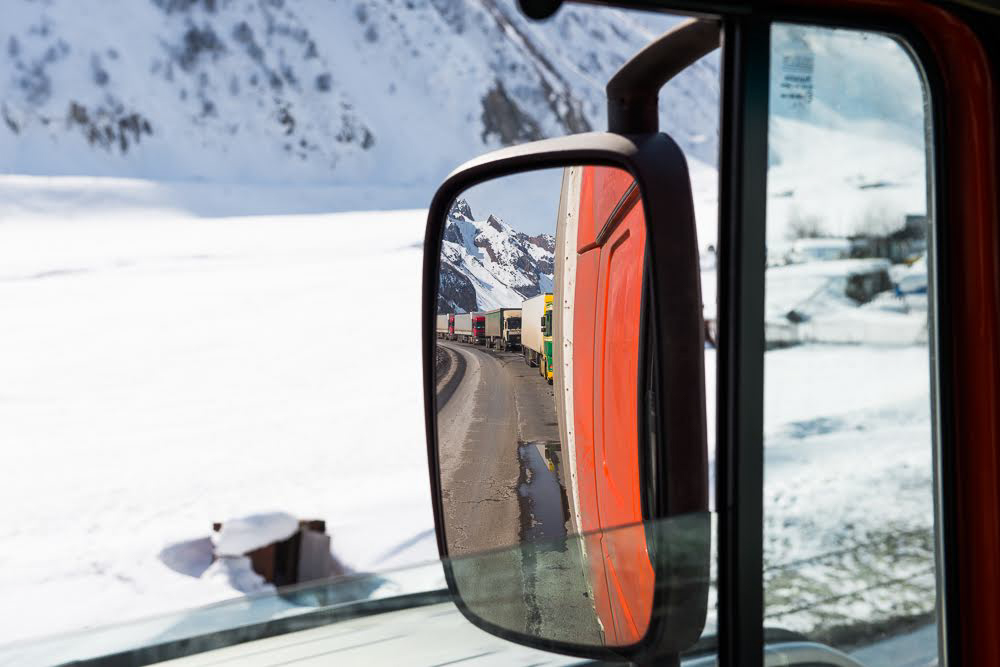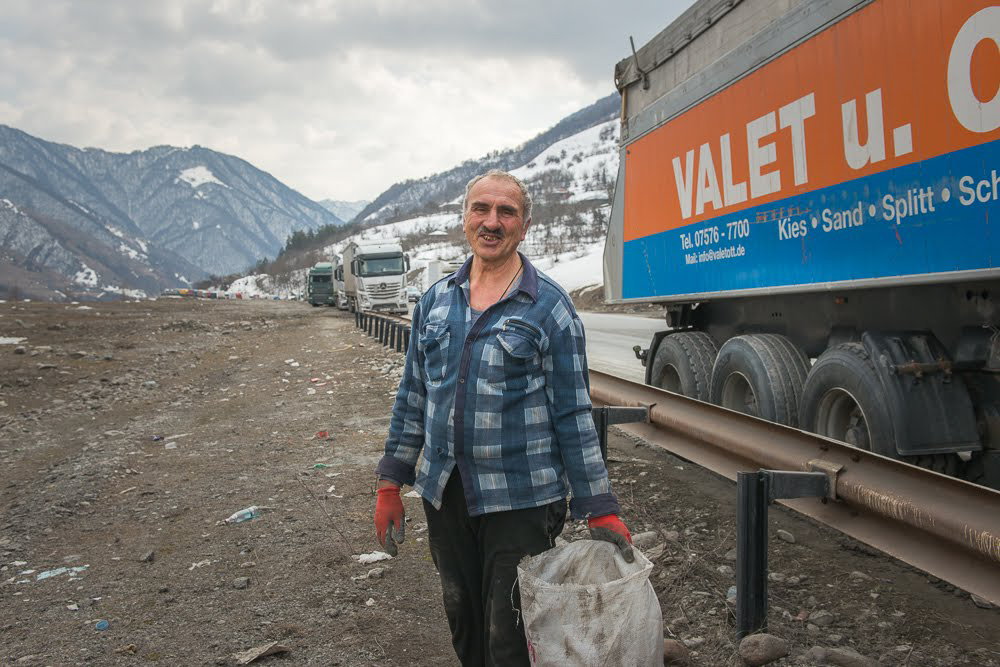
In pictures | The uncertain life of lorry drivers along the Georgian Military Road
One of the most common sights along the Georgian Military Road, after the mountain views, is the lines of lorries queuing at the Russian border.
In pictures | The uncertain life of lorry drivers along the Georgian Military Road
 13 March 2019
13 March 2019


Running from Georgia’s capital towards the popular mountain destination of Stepantsminda, the Georgian Military Road is arguably one of the most beautiful routes in Georgia. One of the most common sights along the route, after the mountain views, is the lines of lorries that stretch for kilometres to and from the Russian border.
From freshly cut Armenian flowers to Russian Samsung phones, tonnes of goods carried on lorries pass through the Dariali Gorge customs point every day. The lorries come from all over the post-Soviet region, in addition to Turkey, but what the number plates do not identify is the nationality of the drivers.
Kazakhstani vehicles are driven by Turks, Russian vehicles by Armenians, Georgian vehicles by Azerbaijanis.
Most of these drivers have driven across Europe without knowing any language other than their own and Russian.



Life on the road is rooted in solidarity and mutual assistance. As the majority of the drivers say, there is never a conflict between them — all the disputes between nations are created and enforced by politicians.
Aganez Manuchayan carries grain from Yerevan to Stavropol Krai. Though it is only 700 kilometres away, he never knows beforehand how long the journey will take.
‘Two trips ago, we spent 10 days just in Georgia. In winter, the lorries can’t travel on both sides of the road; the police reduce the movement to one side because of all snow and ice’.
The drivers first wait on the Georgian side for customs, and then on the Russian. The total time spent waiting can add up to a couple of days.
‘The worst is the uncertainty; we never know how long we’re going to stand.’


Lorries, which are capable of carrying up to 23 tonnes, are perceived as a resource — whenever they are not moving, they are not making money. That is why the drivers, especially in smaller companies, have only a small period of time in between trips to rest, which is reduced if there are delays on the road. Private drivers, who have more competition, rest even less, sometimes spending only two to three days at home at a time.
‘Whenever there’s an order, we just have to drive, no matter what’, Manuchayan says. He recently had to fire a driver from his company and now drives the lorry himself.
Yagub Orujoghlu and Giorgi Elashvili are private drivers from Georgia who mostly travel to Russia.
‘We don’t have families here — these are my parents, my brothers, and my sisters’ Orujoghlu says, gesturing to the line of lorries on the road.
A passing lorry signals and Orujoghlu waves back, smiling. ‘We have a good tradition of greeting each other. We feed the hungry, share tea in winter and water in summer, and help in any way we can’.
Orujoghlu, who’s been driving for 24 years, says he always wanted to travel; driving a lorry gave him this opportunity. But now he longs to be with his family.
‘It’s the hardest part. Four grandchildren are waiting for me today, but I’ll go see them and take a new trip the day after tomorrow.’


While Orujoghlu misses home, Elashvili’s main concern is how much he makes driving a lorry.
‘Last time I went to Krasnodar from Zestaponi for $900. Generally, I make about $2,000 on the trip, of which about $1,200 is used on various expenses. And of the $800 remaining, we spend a good deal on the lorry if it breaks down on the way’.
Sometimes drivers can end up on the road alone, without heating, for days at a time.
‘If the lorry is company-owned, someone will at least come and help fix it, but private drivers can only rely on themselves. We take as much food as we can, but if we’re stuck for days, we have to buy whatever is available on the roadside. Of course, the prices go up when people see we have no other option.’
Bribery is also a cost for the drivers, especially at Russian customs.
‘Where there’s a bribe, there’s a way, that’s how it goes.’ Orujoghlu says.
Two drivers from Armenia and Georgia also spoke of being mistreated by Russian customs, preferring to remain unnamed due to a fear of backlash. ‘They simply don’t see us as human beings. There are horrible lines, the office is a cold room with a single bench but forty people are in it, and we have to stand all night’, one of them says.
‘They take somewhere between ₽2,000–₽5,000 ($30–$75) per pass, and if they write that you are overweight, even more. You have to be alert all the time too as your things might get stolen from the cabin — it happens a lot there’.
Among the top concerns the lorry drivers mention is safety — most work alone. Another concern is exhaustion, as drivers often go without sleep in order to deliver their goods on time.



Maxim Pogotsky, from Belarus, is one of the lucky drivers who has a partner. They switch every nine hours, according to the company’s policy.
‘You have to be responsible. If you feel tired, you need to stop and sleep. The problem is, not all stops are for resting — like now, we’re still at work; we can’t relax because we’re in this line. And when it comes time to drive, you already feel exhausted’, Pogotsky tells OC Media.
Pogotsky dreams of a proper parking area with a few shops, a shower, and most importantly, rubbish bins. He says the police see drivers throw plastic out of their windows but do nothing.
Arsena Kavtarashvili, a 71-year-old pensioner hired by Georgia’s Dusheti Municipality, knows exactly how bad the rubbish problem is. For ₾160 ($60) a month, he picks up the rubbish left on the 4 kilometre stretch of road between Chadistsikhe and Pasanauri.
‘It’s shameful how people behave like pigs. Throwing away rubbish in large plastic bags, as if it’s hard to wait until a rubbish bin’, he says.
Over the three years he has worked here, nothing has changed.
In addition to the rubbish, the long hours spent waiting with the engine on is harmful to the environment.

While Orujoghlu misses home, Elashvili’s main concern is how much he makes driving a lorry.
‘Last time I went to Krasnodar from Zestaponi for $900. Generally, I make about $2,000 on the trip, of which about $1,200 is used on various expenses. And of the $800 remaining, we spend a good deal on the lorry if it breaks down on the way’.
Sometimes drivers can end up on the road alone, without heating, for days at a time.
‘If the lorry is company-owned, someone will at least come and help fix it, but private drivers can only rely on themselves. We take as much food as we can, but if we’re stuck for days, we have to buy whatever is available on the roadside. Of course, the prices go up when people see we have no other option.’
Bribery is also a cost for the drivers, especially at Russian customs.
‘Where there’s a bribe, there’s a way, that’s how it goes.’ Orujoghlu says.
Two drivers from Armenia and Georgia also spoke of being mistreated by Russian customs, preferring to remain unnamed due to a fear of backlash. ‘They simply don’t see us as human beings. There are horrible lines, the office is a cold room with a single bench but forty people are in it, and we have to stand all night’, one of them says.
‘They take somewhere between ₽2,000–₽5,000 ($30–$75) per pass, and if they write that you are overweight, even more. You have to be alert all the time too as your things might get stolen from the cabin — it happens a lot there’.
Among the top concerns the lorry drivers mention is safety — most work alone. Another concern is exhaustion, as drivers often go without sleep in order to deliver their goods on time.



Maxim Pogotsky, from Belarus, is one of the lucky drivers who has a partner. They switch every nine hours, according to the company’s policy.
‘You have to be responsible. If you feel tired, you need to stop and sleep. The problem is, not all stops are for resting — like now, we’re still at work; we can’t relax because we’re in this line. And when it comes time to drive, you already feel exhausted’, Pogotsky tells OC Media.
Pogotsky dreams of a proper parking area with a few shops, a shower, and most importantly, rubbish bins. He says the police see drivers throw plastic out of their windows but do nothing.
Arsena Kavtarashvili, a 71-year-old pensioner hired by Georgia’s Dusheti Municipality, knows exactly how bad the rubbish problem is. For ₾160 ($60) a month, he picks up the rubbish left on the 4 kilometre stretch of road between Chadistsikhe and Pasanauri.
‘It’s shameful how people behave like pigs. Throwing away rubbish in large plastic bags, as if it’s hard to wait until a rubbish bin’, he says.
Over the three years he has worked here, nothing has changed.
In addition to the rubbish, the long hours spent waiting with the engine on is harmful to the environment.



Despite the long working hours, kilometres of waiting, exhaustion, and detachment from their families, most of the drivers love what they do.
‘This kind of life on the move is very interesting, first of all, because of the communication. When you live in a single spot, be it Minsk or Tbilisi, you have your small circle of acquaintances and that’s all. When you live without borders, you start to look at many things differently, and it becomes more obvious that mass media often projects one-sided views on the situation between countries’, Pogotsky tells OC Media.
‘We go out and converse with other drivers without looking at the number plates. Of course, we discuss domestic problems, but we never fight over anything. There are Ukrainians and Russians talking to each other normally. This is the attitude I’m teaching my seven-year-old son now.’
Pogotsky adds that he felt countries would benefit if they were more open to each other.
‘But it’s all decided on the higher levels, by those who don’t stand in these lines, who go everywhere without lines, and with their escorts’ lights flashing.’






